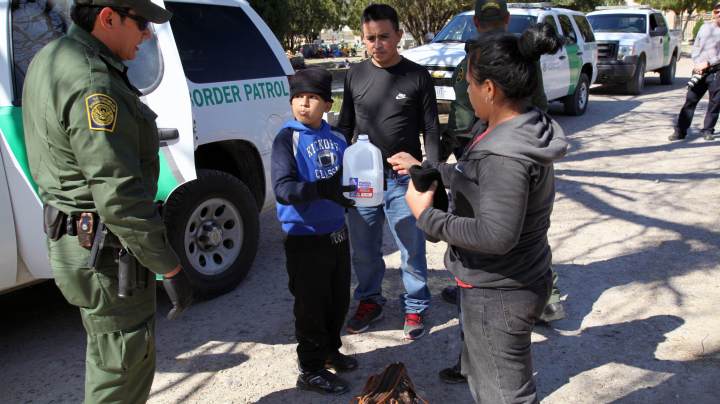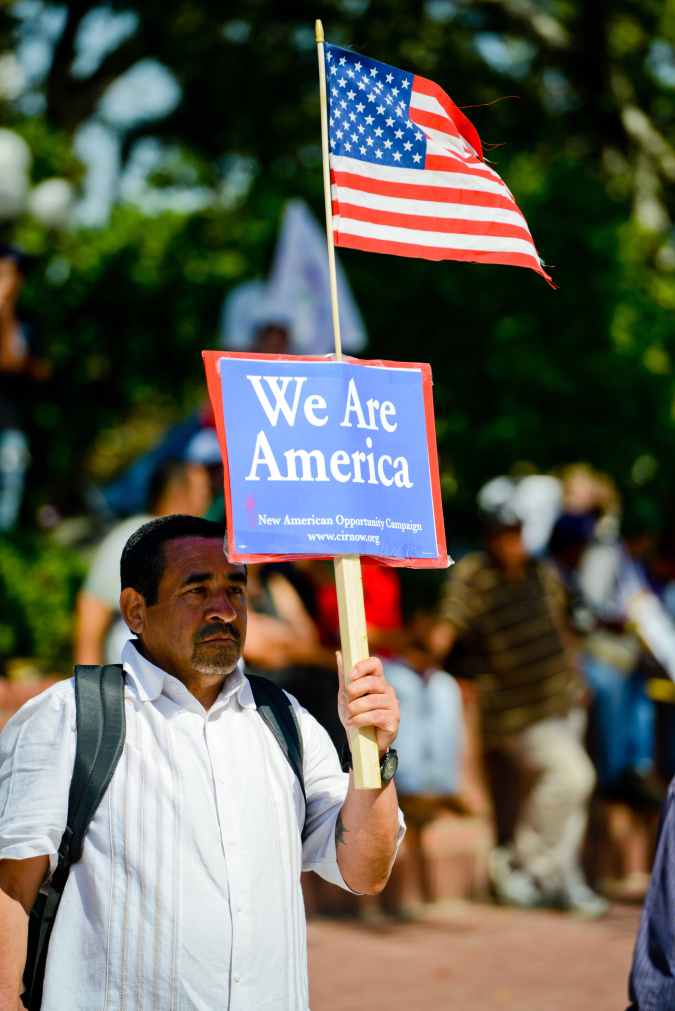This Podcast Explores the Last 20 Years of Our Broken Immigration System

Border Patrol agents take a family from El Salvador into custody at the city cemetery for illegally entering the United States by crossing the Rio Grande River. The family, from San Vicente, was fleeing gang violence, which is rampant in El Salvador. Photo b Vichinterlang /Editorial RF
At the beginning of 2017, the words immigration and deportation saw sharp jumps in searches, according to Google Trends. It’s around this time that President Donald Trump signed executive orders intending to round up a larger number of undocumented immigrants – including those with criminal records – and to enact a Muslim ban. It’s easy to point the finger at Trump – who has previously vowed to deport the more than 11 million undocumented immigrants living in the United States – when it comes to the United States’s broken immigration system, but the truth is that this issue predates his presidency and will continue to plague the nation after his tenure ends. That’s why a new podcast is exploring the last 20 years of immigration law in the US to learn how these policies have had long-lasting effects and dehumanized individuals often presented as nameless criminals.
Titled Indefensible, this podcast aims to show how the deportation machine affects real people and their families, and how undocumented immigrants are resisting in these challenging times. Host Will Coley and two co-producers spoke to five immigrants who have made the United States their home. While they live in all pockets of the US and were born from various countries around the world, they all have one thing in common: They’ve all had interaction with law enforcement.
“We were very interested and spoke to some people who had some sort of conviction or had some sort of conviction or had some sort of interaction with law enforcement, because it seems like … even over the last 20 years, people have really sort of demonized people with convictions and not really thought about how people end up in this intersection of criminal justice and immigration,” Coley told me in a phone interview. “So we really wanted to tell those stories in a way that built more sympathy for them and more understanding about why people could be in those situations and how those folks shouldn’t be thrown under the bus when it comes to talking about immigration rights and immigration reform.”
Recorded in the middle of 2016, the podcast came at a time when Trump winning the presidency seemed impossible to some. So while none of those featured in Indefensible explain what it’s like living as immigrants at risk for deportation under the Trump era, what they share is as pressing now as it was then.
A lot of it is because in the last 20 years, immigration laws have become much more severe. According to the Miami Herald, between George H.W. Bush’s and Bill Clinton’s presidencies, there was a steep increase in deportations. The number went from 141,326 removals to 869,647 deportations – something partially attributed to the 1996 immigration laws. As Time reports, these laws have made countless immigrants “victims of fast-track deportations and unjust, arbitrary detention; families and communities have been torn apart; and entire generations of immigrants have been criminalized.”

These same narratives persist more than 20 years later, which is why a podcast like Indefensible is so necessary. Undocumented immigrants don’t always have the opportunity to tell their own stories in their own words. This series centers their voices, with Coley and immigration advocates merely helping to push the plot along.
“You hear a lot of media representations – like ICE (Immigration and Customs Enforcement) raids, hateful rhetoric – but barely hear from immigrants who are facing it themselves,” Michael Velarde, Development and Communications Director at Immigrant Defense Project, told me over the phone. “There’s this idea that immigrants are just totally paralyzed by fear, but these stories I think also demonstrate that… they’re also extremely resilient and determined to move forward.”
This is especially true for Eddy Arias, a 29-year-old undocumented immigrant living in Texas. The first episode of the podcast tells his story. At age 22, police pulled Arias over, and what followed changed his outlook on life. An officer racially profiled him and accused him of driving under the influence. The officer tried to coerce Arias into taking a breathalyzer. Arias, who hadn’t been drinking, refused and insisted on receiving a blood test instead. He ended up in jail. Given the choice of pleading guilty for a reduced sentence or fighting, he chose to fight. He knew he hadn’t done anything wrong, but he still ended up in jail and then an immigration detention center for far longer than if he had just agreed to settle.
But he knew he couldn’t agree to something he didn’t do. The experience motivated him to become more politically active. As a result, he shares his story whenever possible. He decided to participate in the podcast because there are so many who can’t speak for themselves.
“I decided to do it not for me, but for the people that I was in .. the immigration detention center [with]. We all bonded when we were in that immigration detention center, because at the end, what we had was just ourselves, each other. So I got to meet people when I was there, and I would tell them all my story and they were just shocked. They were like, ‘What? You went to college here? Why are you even here?’ And they told me, ‘You’re gonna get out of this, and when you get out of this, you tell your story.’ And that’s why I did, because I feel like in a way by me telling my story, I’m in a way speaking on theirs, too.”
Eddy’s a Deferred Action for Childhood Arrivals (DACA) recipient – which means that he arrived to the US at a young age, has a clean record, and has permission to work in the country. Given that the current administration can easily revoke the President Barack Obama-enacted program, Arias’ future hangs in the balance.
Many have told him that he deserves to live in the US because he works hard, went to college, and has done everything the “right” way. But Eddy believes that this sort of thinking singles out immigrants who aren’t high achieving or who have made mistakes. “I’m no better than my parents or no better than the guy who’s working at McDonald’s or cutting the yard. Essentially and morally we are the same,”he added. “So there’s no reason why I should deserve to stay here and the person who is working in construction should not.” They’re another reason Eddy must use his voice and tell his story/continue to fight.
There are currently two episodes of Indefensible available. The second episode follows two sisters – one who is a longtime permanent resident and one who is a United States citizen – and it so clearly demonstrates how the immigration system relentlessly punishes the undocumented community. Linda and Lundy Khoy both got in trouble with the law as teenagers for the same crime. While Linda has been able to move on, Lundy – who has turned her life around – fights for a second chance. Because as much as immigration laws are supposed to protect our nation, they’re also detrimental to people just trying to build a life in this country.
New episodes of Indefensible will premiere throughout June, Immigrant Heritage Month, on Thursdays. Check them out here.